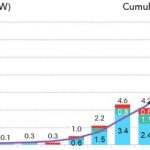Starting in 2021 many of Germany’s existing “pioneer” wind turbines, solar PV installations and biogas plants – launched with generous price guarantees - will stop receiving fixed feed-in tariffs. That means renewable capacity may be shut down if they can’t find a new business model to run on. The new rules comes at a decisive time for Germany’s energy transition as it tries to increase renewables to meet emissions targets and gradually increase … [Read more...]
Biogas and Biomethane in Europe: Denmark, Germany, Italy lead
Over and again, legislators worldwide are confronting the same question: which technologies do we subsidise and support, when, by how much, and for how long. Get it right and those costs will reduce and should disappear once scale is reached. Solar and wind are on their way to proving that. What about biofuels? Marc-Antoine Eyl-Mazzega and Carole Mathieu of the Institut Français des Relations Internationales (IFRI) look at the last 10 years. The … [Read more...]
PPA 2.0: future-proofing corporate energy funding
Power purchase agreements (PPAs) are a significant tool for funding the energy transition. Research by DNV GL suggests that, as renewable energy becomes more widespread, its price dynamics becomes more complex, and that matters to PPAs. Some governments are looking to phase out subsidies and feed-in tariffs, effectively softening their price guarantees. Also, as renewables generation grows, market prices can fall. Martijn Duvoort, Director Energy … [Read more...]
Fieldfisher Interconnectors Forum – Brussels, 21 March 2019
The Fieldfisher Interconnector Forum will take a highly topical look at Interconnectors across Europe and the UK. This free half day event will cover significant legal developments and hot topics, including: The Outlook for Interconnectors - Future Opportunities Brexit and Future Energy Trading Scenarios Energy Market and Regulation Updates Environmental and Planning Perspectives Attendees will hear from Will Bridges, … [Read more...]
Get this: Germany does not have generous subsidies for renewables
In an otherwise well-written and informative article on the recent decision by the EU Court of Justice on renewables policy, Energy Post repeats the unfounded notion that Germany has generous subsidies. This is wrong – and the difference matters: the German system of feed-in tariffs favours small companies and cooperatives. Now, the EU wants to kill feed-in tariffs, ostensibly because of the cost – but what’s at stake is freedom. … [Read more...]






